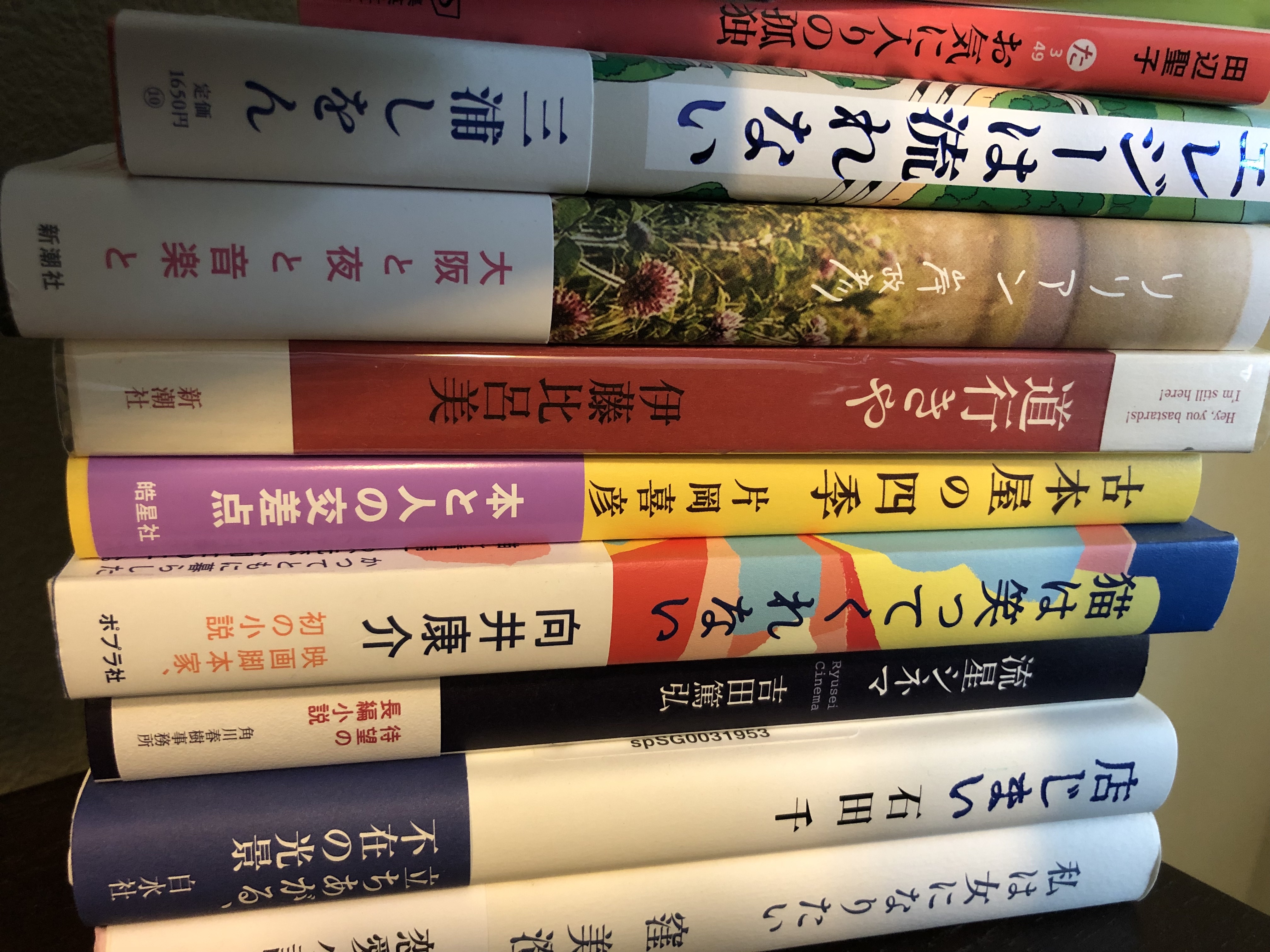キネマの神様
原田マハ
文藝春秋, 2013
God of the Cinema
Maha Harada
Bungeishunju, 2013
[No English translation available]
One reviewer of this book said she become so caught up in this book that she started reading it at 11pm, read it until she heard the sound of the motorbike delivering the morning newspaper, slept a few hours and then read to the end. But what convinced me to pull this book off my shelves was her comment that this book made her glad that she was born Japanese so that she could read this book.
The story centers on Ayumi Maruyama and her father, known as Go. When the story begins, Ayumi has just quit her high-ranking position at a development company, rather than accepting a transfer that is essentially a demotion, and Go is recovering from heart surgery.
Ayumi has always followed her father’s advice to find what you love and stick to it, no matter how hard it is, and as a result she was able to work at a large company developing theater complexes. At the same time, her single-mindedness made her enemies at work and left her single at age 40.
Go was dealt a lucky hand of cards when he was born. He was born to parents who lost their house but survived the Kanto earthquake, spent his childhood in Manchuria, made it through WWII without a scratch, married a dependable woman, and was always able to rely on his wife and friends to bail him out from his gambling debts. However, his heart surgery and his wife’s discovery that he has the equivalent of about $30,000 in debt from playing mahjong and gambling on horse races seem to suggest that his luck has run out. Ayumi and her mother consult experts on gambling addiction, and are told that by always paying off his debt, they have been enabling him and must cut him off from any source of money. They sequester his pension and, left with only enough money for a few visits to the movie theater and DVD rentals, Go falls into a depression.
Despite all of his failings, Go’s enthusiasm for life has earned him a few constant friends. Terashin, the owner of a meigaza theater that shows classic films and holds retrospectives, loves Go as he is. Telling Ayumi that he knows Go has used the money he loaned him to play mahjong, he says, “I like that about him. He may be a bit of a charlatan, but he’s big-hearted. These days, there aren’t many people who are that joyfully irresponsible. … When I see how dogged he is in living life his own way, it makes me feel that as long as there are movies in this world, there’s a reason for me to keep this theater going. The God of the Cinema hasn’t abandoned me yet.”
It was Go that told Terashin about this “God of the Cinema.” He writes,
Movie theaters are actually temples to entertainment. One step into these temples and you have entered a sacred area occupying a different dimension. Movies are an offering to the gods living in this temple. Ever since I was a child, I have sensed the presence of the god of cinema watching the movie together with me somewhere in the theater. This god might enjoy the movie, but more than anything else, he finds joy in the pleasure of all the people watching the movies. … I keep talking about these gods, but in reality I’m not a religious person. And yet still, I sense a strength that I cannot see with my own eyes and a presence that is beyond human knowledge. When I watch a truly great movie, this feeling is particularly strong.
While Go is in the hospital, Ayumi finds stacks and stacks of notebooks that her father has filled with notes on the movies that he has seen. Although he writes in an unsophisticated way, it is his frank pleasure in movies that draws her in. On a whim, Ayumi scribbles an entry of her own on a piece of scratch paper and tucks it into his notebooks. Inspired by a recent visit to Terashin’s meigaza, she likens these meigaza to village temples:
Snug, simple places with a good atmosphere. No gaudy shrines or showy events here, just the kind of temple that hosts a quiet summer festival with cotton candy and cold soda and goldfish catching games. That girl you’ve had your eye on will come in her yukata. Those short summers have a poignancy so sharp it makes your heart ache. And yet these places are dying out, one by one.
It is these hastily scribbled words that finally result in a new job for Ayumi at Eiyu, a movie magazine. Hoping to keep her father away from the temptations of mahjong and horse races, Ayumi had taught her father to use the Internet to read movie blogs and check on theater showings (he even keeps a glass of sake by his computer, just as you would leave an offering in front of a shrine). Finding her notes in his notebook, he posts it on Eiyu’s blog. This magazine was originally just one of the assets of a large company, one of the first companies to obtain distribution rights for Western movies in Japan. Now only the magazine is left, and it is also on its last legs. The editor is hoping that Ayumi will be a fresh new voice for the magazine.
However, it is really Go that rescues the magazine. He becomes the main blogger for the magazine’s website, given the title “apostle of the God of Cinema.” His posts bring in comments from all over Japan, and they even post English translations with help from Ayumi’s former colleague. And this is where the storyline takes another turn. Somebody only identifying himself as “Rosebud” begins responding to Go’s movie reviews on the English site, and his erudition and deep knowledge of movies reveals that he is not your usual blog commentator. The back-and-forth between Go and Rosebud draw in large audiences, and their arguments about the merits and shortcomings of “A Field of Dreams,” “Roman Holiday” and “Letters from Iwo Jima” are part of the pleasure of this novel. We finally learn Rosebud’s identity when Go asks for his help in saving Terashin’s movie theater, which has been threatened by the construction of large movie complex nearby.
This book could easily have become maudlin and marred by a series of convenient turns in the characters’ fortunes, but luckily (for the reader), Go’s failings and Ayumi’s prickliness always stand in the way of tidy resolutions. And as Terashin says, “The God of Cinema does not grant miracles that easily. Gods are actually quite heartless, you know.”
In the end, though, Maha Harada gives us an ending worthy of all those great movies Go and Rosebud discuss, bringing the characters together in a movie theater. Because after all, “no matter what the movie is, if you are watching it with the person you love in a theater you love, that is the best movie of your life.”
(To see a favorite scene from the movie they watch, click here.)

















Recent Comments